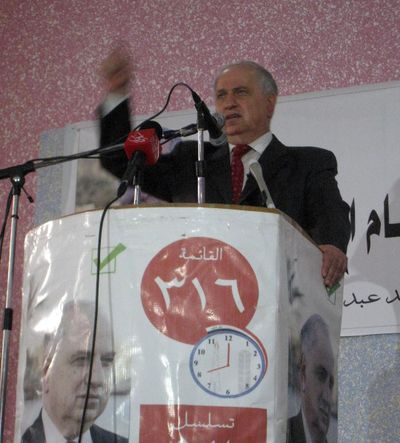Iraq’s comeback artist
Once a U.S. ally but now discredited, Chalabi is poised for political revival

BAGHDAD – The Bush administration introduced Ahmad Chalabi, the former U.S. ally and perennially controversial Iraqi politician, as a secular, pro-Western Mr. Fix-It who could slide right into Saddam Hussein’s old seat.
Instead, he embarrassed the Bush White House with bogus pre-war intelligence, aligned himself with Shiite Muslim extremists and got uncomfortably friendly with Iran.
Now, he’s No. 3 on an electoral ticket alongside Iraq’s biggest Shiite Muslim factions and his name is cropping up regularly as a potential prime minister. If Chalabi does finally ascend to an elected post in Iraq, Washington won’t be cheering. These days, the nimble politician’s fortunes are more closely tied to militant Shiite factions and their allies in Tehran than they are to Washington.
“The Americans outplayed themselves. Nobody outplayed them,” Chalabi said in an interview with McClatchy Newspapers last week in Baghdad.
“They believed their own propaganda.”
Pundits periodically declare Chalabi finished – personally discredited, his cronies arrested, his calls intercepted – only to watch him re-emerge with even more powerful backers. Now, his jockeying ahead of the March 7 election all but assures him a parliamentary seat at the very least, perhaps Cabinet-level if his bloc fares well.
Ties to Iran
While Chalabi says he hasn’t ruled out another rapprochement with the U.S., it’s apparent that his focus these days is forging alliances at home and nurturing his ties to power brokers in neighboring Iran, which has become Iraq’s biggest trade partner.
At a campaign stop last week in the impoverished Shiite town of Husseiniya, on the northern outskirts of Baghdad, Chalabi was feted with poetry and chants that thanked him for his role in getting rid of Saddam. He commiserated with townsfolk that it was “a shame” for Iraq to be so resource-rich and yet to have its wealth siphoned off by corrupt politicians before it could trickle down to hardscrabble places such as Husseiniya.
After the speech, Chalabi’s vast security detail bundled him into waiting SUVs for the next stop: a courtesy call to a school in Sadr City that was built by the Iranian ambassador. The trip was scuttled at the last minute; a sandstorm was whipping up and impaired visibility.
Viewing Chalabi as merely an Iranian pawn would be a mistake, according to current and former U.S. officials, who say the politician has a long history of taking support wherever he can find it.
“He’s certainly an opportunist. He’s also an Iraqi nationalist,” said Ryan Crocker, who served as the U.S. ambassador to Iraq until February 2009.
Crocker suggested that should Chalabi someday become prime minister, which he said is a distinct possibility, he may end up disappointing his Iranian backers as much as he has his former American allies. “He isn’t going to be Iran’s agent,” Crocker said.
Split with U.S.
The split between the U.S. government and Chalabi, who sat behind then-first lady Laura Bush during the 2004 State of the Union address, began years ago. Most of the intelligence about Saddam Hussein’s weapons of mass destruction and terrorist ties that his Iraqi National Congress fed to the Bush administration as the group lobbied for an invasion turned out to be bogus.
Then, in June 2004, months after his attendance at the State of the Union address, FBI officials began investigating whether Chalabi had told the Iranians that the U.S. had broken their communications codes – a charge that Chalabi consistently has denied.
The vitriol reached unprecedented levels in recent weeks as the de-Baathification commission led by Chalabi and his close associate Ali Faisal al-Lami began disqualifying hundreds of Sunni and secular Shiite candidates without due process, a move that’s counter to the Obama administration’s hopes for an inclusive election and political reconciliation in Iraq. It didn’t help that those overseeing the process were also running for office.
“Under normal circumstances, that alone might have sufficed to discredit the elections. But these are not normal circumstances, and for the sake of Iraq’s stability, the elections must go on,” said the International Crisis Group’s latest Iraq report, released Thursday.
Angry words
When U.S. officials complained about the purges, Chalabi’s camp shot back that the Americans were interfering with Iraq’s sovereignty. In mid-February, the jabs got sharper as Army Gen. Raymond Odierno and U.S. Ambassador Christopher Hill, the top military and civilian American officials in Iraq, accused Chalabi and al-Lami of being under Iran’s influence.
“Of course, I deny that we’re under the influence of Iran. I deny that we do Iran’s bidding. I confirm that we’re friends with Iran, just as we wanted to be friends with the U.S.,” Chalabi said. “We’re on the fifth, maybe sixth, cycle of on-again, off-again with the United States. Every time what I do obstructs a policy objective of theirs, they put forth this accusation.”
A delegation from the European Union spent an hour last week quizzing Chalabi at his compound about the efforts to sideline political opponents under the guise of de-Baathification. Once the tough talk was over, however, the Europeans couldn’t resist asking for a souvenir photo with Iraq’s best-known political phoenix.
As the camera flashed, one of the delegates joked, “I hope we’re not on the de-Baathification list now.”
“No, only General Petraeus,” Chalabi replied.